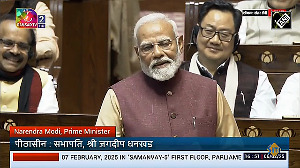David Frigstad, chairman of Frost & Sullivan, is confident that economists will miss the economic boom this decade is poised to witness. Frigstad, who is in India to address Frost & Sullivan's global flagship event, GIL 2011: India, The Global Community on Growth, Innovation and Leadership, spoke about issues impacting companies today and why all is not as bad as it looks.
Frigstad, who is in India to address Frost & Sullivan's global flagship event, GIL 2011: India, The Global Community on Growth, Innovation and Leadership, spoke about issues impacting companies today and why all is not as bad as it looks.
Growth is a big issue for companies in advanced economies. Where will the next wave of growth come from?
The biggest growth drivers will come from productivity gains out of emerging technologies. They will transform sectors like education, automobiles and transportation.
These technologies will create a wealth of opportunities. The next 10 years will see economic boom that economists will miss. New platforms will be developed; they will empower the population globally.
Given that the world is a lot more unpredictable and volatile, what kind of leadership is required to deal with this business environment?
Today it's important that the CEO understands the growth risks. Nearly 60 per cent leadership positions are lost in every 10 years.
The pace of business has changed. So, if you are a me-too product, you won't remain in business. CEOs have to be open-minded today and see industry convergence.
They have to have a unique position or a blue-ocean strategy. Most CEOs tend to focus on industry expertise, but that's a hindrance. Managers today need to be curious and go out there.
What industries will see change in the coming times? Which ones are at risk?
Automakers, for instance, will go through unbelievable change. Traditional automakers will see change in terms of
In one sense, all industries are at risk. All of them face the pressure to survive. Nobody would have imagined that HP, which started out as a hardware player, would one day question its hardware play.
If you are not changing 180 degrees every 10 years, you will not survive.
What is the future of the Indian IT services industry? Do you think protectionism will become a threat?
The Indian IT services industry needs to innovate. It has to come up with a unique proposition. Only competing on price may make survival difficult. The discrepancy in salary will even out over time and the competitive field will change.
Protectionism is the death of any industry as it's a bad idea. Protectionism makes companies lazy and unproductive. Today consumers are a lot more homogeneous as they belong to a globalised world.
Increasingly Indian companies are globalising. What is the biggest risk that they face?
It's a pre-requisite and Indian companies need to be in the global playing field. But what's holding Indian companies back are its marketing practices or the lack of them.
India is behind the curve when it comes to marketing and branding, in fact, many companies don't even have marketing divisions. This is probably because India has been cut off from the rest of the world for a long time.
Where is the opportunity for Indian companies?
The opportunity is huge for India as it has a big advantage over China. India has an understanding of business and has a common language.
For instance, I am told that the Aravind Eye Hospital does a large number of cataract eye surgeries for as less as $25. In healthcare alone India has a great opportunity to make a global impact.











 © 2025
© 2025